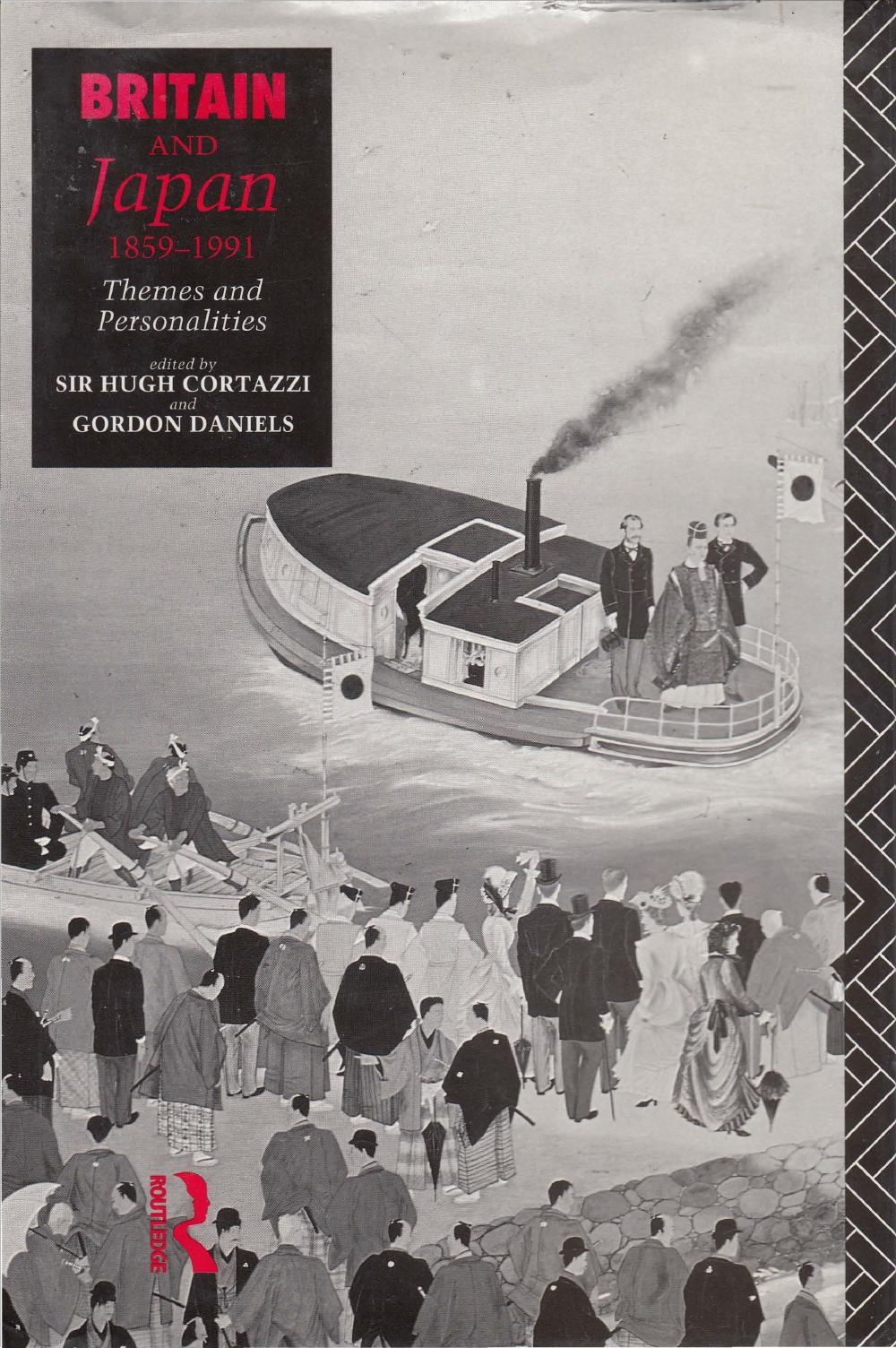Britain and Japan 1859-1991: Themes and Personalities
Edited by:Cortazzi, Hugh and Gordon Daniels
Publisher:Routledge
First published:1991
This edition:1991
ISBN:0-415-05966-6

Description
Britain and Japan 1859-1991 is a celebration both of the individuals who have worked to bring relations between the two countries closer and, in particular, of the Japan Society of London, which marks its centenary year in 1991. By focussing on the key personalities - both British and Japanese - who have made significant contributions to political, economic and cultural relations, this book charts the course of the relationship from the opening up of Japan in the mid-nineteenth century to the present day.
Contents
This volume was published on the occasion of the centenary of the Japan Society, and in this chapter Sir Hugh Cortazzi chronicles its hundred year history, from its founding at the 1891 Congress of Orientalists, via the two world wars and a number of royal visits, through to the 1991 Japan Festival and an assessment of the Society's then challenging state of affairs.
This chapter details the life of Charles Wirgman (1835-1891) and his journalistic career in Japan, including as correspondant for the Illustrated London News and the founding of his satirical review the Japan Punch in Yokohoma. Wirgman was a key observer of the opening of the country, having arrived in 1861.
This chapter assesses the life of William George Aston (1841-1911), a diplomat and prominent scholar of Japan. Though Aston remains somewhat of a shadowy figure due to the lack of knowledge of his private life, this appraisal details how his scholarly works in the fields of linguistics and religion have stood the test of time.
Detailing Sir Ernest Satow's (1843-1929) diplomatic and scholarly career, including his time as head of the British Mission in Japan.
This chapter details the life of Josiah Conder (1852-1920) and his teaching of western-style architecture in Hery Dyer's new Engineering College in Tokyo as part of the Meiji regime's efforts towards modernisation. Conder inspired Japan's first generation of western-style architects, and proved to be immensely popular with the Japanese authorities, although they resisted his attempts at Japanese influences in his work.
This chapter covers the life of Walter Weston (1861-1940) an Anglican clergyman who is also responsible for pioneering mountain climbing as a popular leisure sport in Japan.
This chapter details the life of Baba Tatsui (1850-1888) and his attempts to introduce Japan to western ideas of government, with particular focus on his time spent in Victorian Britain, where he developed a great understanding of the political system and was not entirely uncritical of Britain and its role in the world.
In this chapter, the lives of Sir Francis Taylor Piggott (1852-1925) and his son F.S.G. Piggott (1883-1966) are detailed in their relation to Japan and involvement with the Japan Society of London. Sir Francis was one of the founders of the Society, and his son was the guiding energy behind its post-war revival.
Basil Hall Chamberlain (1850-1935) was a writer and prominent Japanologist, inspiring a generation of influential students. In this chapter, his life and career are assessed.
This chapter covers the development of technological education in early Meiji Japan, including a profile of the career of Kikuchi Kyōzō (1859-1942).
Profiling the involvement of Hayashi Tadasu (1850-1913) in the formation of the Anglo-Japanese Alliance as well as looking more broadly at his political appointments, from secretary to the Iwakura Mission to promotion to the London legation. This article also details Hayashi's scholarly achievements as a writer and translator.
Marie Stopes (1907-1958) is most widely known as the pioneer of birth control and sex education for women in Britain. This chapter details her often forgotten early years in Japan, including her published works on Japanese theatre and her love affair with a professor at Tokyo University, as well as her employment as the first female Western scientist to work at Tokyo University.
Sidney (1859-1947) and Beatrice Webb (1858-1943) were political activists devoted to the labour movement in Britian. Between 1911-1912 they embarked on a world tour, visiting Japan and writing an account of their journey.
This chapter details Malcolm Kennedy's (1895-1935) time in Japan as an army officer sent to study Japanese while attached to a Japanese army unit, his subsequent work at Shell Oil, and his stance as an apologist in the build up to the Second World War.
Sir Charles Eliot (1862-1931) became British Ambassador at Tokyo in 1919. This chapter details his life and career as an often overlooked figure in Anglo-Japanese relations, who made significant contributions to scholarship and whose time as ambassador coincided with the end of the Anglo-Japanese Alliance.
This chapter considers the career of Admiral Yamanashi Katsunoshin (1877-1967) including his key involvement in the Naval Limitations Treaty and time in the Imperial Japanese Navy.
This chapter details Arthur Waley's (1899-1966) career as one of the great translators of Japanese literary works and as an inspiration to generations of Japan scholars.
This chapter considers the career of Tsubouchi Shōyō (1859-1935) as a pre-eminent scholar and translator of Shakespeare, focussing on his connections to the town of Sherbourne, Dorset.
This chapter considers the time spent in Japan by South African writer William Plomer (1905-1974) and how this influenced his later works such as Paper Houses.
A consideration of George Allen's (1900-1982) career as an economist and lecturer in Japan.
As the first British Ambassador to Japan after the War, Esler Dening (1897-1977) was the central figure in Anglo-Japanese relations at a time when British opinion was distinctly anti-Japanese.
This profile considers equally Sir George Sansom's (1883-1965) career as a diplomat, in which he pioneered the serious study of the Japanese economy, and historian.
A chronological overview of Anglo-Japanese Relations between 1858-1990.

